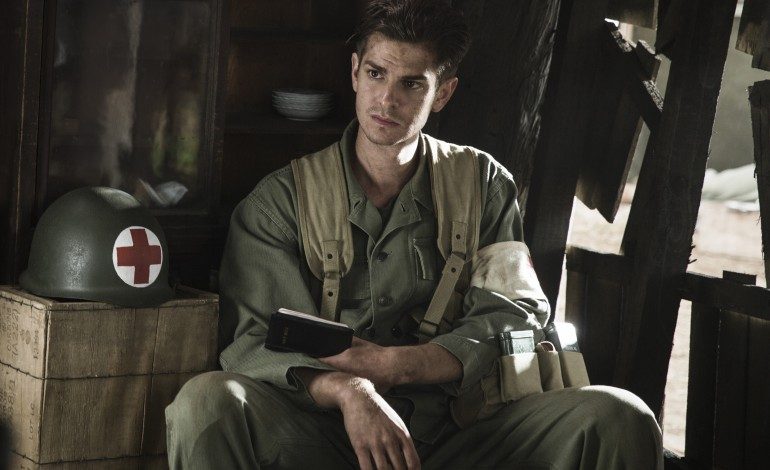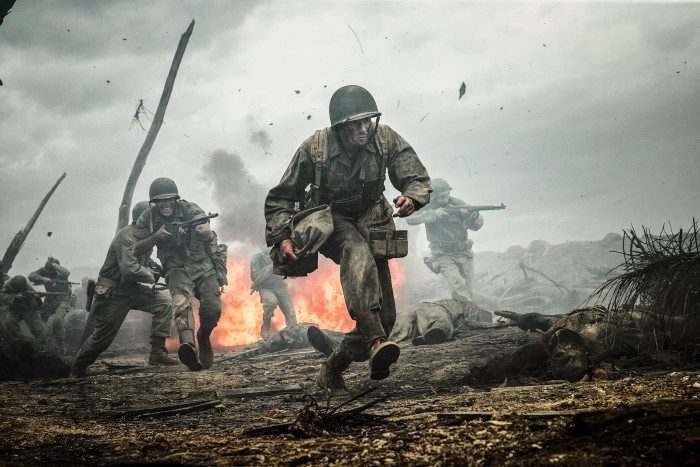

Previously, we reviewed Mel Gibson’s latest film Hacksaw Ridge. Here’s a different take.
In war there are tough decisions that will greatly affect us long after the soldiers return home. It’s been nearly ten years since Mel Gibson has sat in the director’s chair and here he returns to bring us a brutal war film, a heartbreaking story of one man’s courage, and a story that almost seems impossible to believe. Hacksaw Ridge tells the story of a young man by the name of Desmond Thomas Doss who saved the lives of many men during the second World War all without firing a shot or holding a weapon in his hands. It sounds almost impossible to believe that one man could possibly survive the sheer brutalness of war without having a weapon to protect himself, and Andrew Garfield who plays Doss gives us a very compelling performance. The opening shots of the film give us a harsh preview of what’s to come then pulls back to give us a story of the young man before he steps into the shoes of a true hero to many.
It’s 1942 in Virginia and people around the town are enlisting to fight the war overseas. Desmond and his brother both enlist much to the dismay of their father Tom (Hugo Weaving) who is still suffering from the horrors of World War 1 and seeing his close friends not return home with him. Prior to all of this Desmond saves a young man from an injury and ends up meeting a nurse Dorothy Schutte (Teresa Palmer) and is instantly captivated by her. They both fall in love and the romance and chemistry between them is a high point of the film. Doss wants to serve but firmly holds on to his belief that taking a human life is a sin and is something that he cannot do. He knows he can serve without holding a rifle so he puts forth his interest in medicine and enlists as a medic. His father is shocked and Dorothy is scared for Desmond because of the risks of never coming home are so great.
Desmond arrives at Boot Camp and is led by Sergeant Howell (Vince Vaughn) who is very stern and makes no joke about the training that each man will be going through. Vaughn is amazing in his performance as he portrays a tough as nails officer. He’s stern, tough, and reminds me a little of Captain Sobel (David Schwimmer from Band of Brothers). At Boot Camp the men learn of Doss and his beliefs. He won’t pick up a firearm, won’t strike a man even when he is hit, and most certainly will not take a human life. “Don’t look to Doss to save your life,” says Howell. Doss is eventually assaulted, accused of being a coward, and is even court-martialed. Despite all of this mistreatment, Doss won’t back down. He wants to serve and stands by his beliefs.
Doss is eventually awarded the chance to serve without a firearm which sounds nearly suicidal. The Battle of Okinawa begins and Mel Gibson shows us the reality of war. Blood sprays, body parts fly, and soldiers are mowed down by bullets. The scenes of war are terrifying, heart grasping, and feel so real. What I found interesting is that a lot of the war scenes didn’t focus entirely on Doss, but rather other soldiers in his unit. I believe that Mel Gibson wanted to grasp the Battle of Okinawa in how everything happened and chose to not shy away from the brutality of it. War isn’t pretty nor enjoyable to watch, and in that sense Gibson achieves in setting that mood. Emotions can be very high while watching the battle scenes due to the fact that they do feel so surreal.
Garfield is truly exceptional in this film as he runs to save more and more men without stopping. He even asks God to find just one more man. His courage is admirable and the chaos of violence around him makes for some truly intense sequences. I found that when he quotes the Bible and makes references to God was as important and the war scenes themselves. This is what defined Doss, he was a very religious man and showcasing what he believes made me feel for the character that much more. It was quite unique to see a person hold onto their beliefs and ideals so much that not one could alter his opinion and when it was time to save someone’s life, it was the injured that were calling for Doss to save them. There is even one scene when Doss comes face to face with an injured Japanese soldier and gives him bandages to tend to his wounds. This scene in particular is a prime example of the humanism that Doss lived by when he first enlisted.
Despite the fact that Doss was a pacifist at heart, the film that tells his story is not so. This is a very violent war film with battle scenes reminding me of Saving Private Ryan. The battle sequences are very intense and just the thought of one man running to save the wounded while under constant threat of being killed is heart-wrenching. Critics have compared Hacksaw Ridge with Saving Private Ryan on the level of violence and realism of war and for that I say, “Thank you Mel Gibson.” I prefer that war films be as realistic as possible because war is not something to revel about; it’s scary, it’s brutal, and something that no one should experience. Doss is one of the stories that needs to be told and remembered. So be warned at the level of violence present in this film. If you can get past the violence and horror, you will experience a very unique war film. It’s about one man’s beliefs and how he utilized them to achieve something truly heroic; it’s an anti-war film. Gibson shows us the violence, the beliefs of one man, and the courage and horror of what he went through. Doss is a hero and Garfield brings that hero to life.

